
WORKERS’ Day, May 1 or May Day, (celebrated today, May 2) provides us all with a time to reflect. To reflect not just on the more obvious roles of the 6.6 million workers in the formal sector of the South African economy and of the 450,000 in the mining sector alone, but also on the contributions that these often unsung individuals have made to our country, to our people and to our mining industry on which so much of our economy and welfare depends.
Despite the technical advances the mining industry has made over the past decades, our narrow-reef deep level mines – platinum and gold – remain labour-intensive operations. Further change is taking place, and will continue to do so; change that provides miners with new skills. As these technological advances bring change to the rock face, their successful implementation depends on the people who will use them.
At Lonmin, and no doubt at other companies’ mines too, people not only adapt to new techniques but, drawing on their practical experience of them, advance the bank of knowledge by advising management on ways in which the new technologies can be refined and advanced. There is little that can beat the experience that the people at the rock face bring to their work. It is a facet of the mineworker’s contribution that is frequently overlooked and not appreciated.
For good or ill, our employees are attracted from across South Africa and from our country’s neighbours. That is an inescapable part of the mining industry’s history.
Workers often come from rural areas, leaving behind their families and friends. And much of the money they earn on the mines is sent back to their rural homes, to contribute to the upkeep of their dependants.
The figures can be inferred, and each miner is reckoned to be responsible for the direct upkeep of as many as 10 dependants. Looked at this from another perspective, each individual miner’s work represents an act of individual generosity to those who are dependent upon those remittances back home.
From the basis of cold economic analysis, the wages our employees earn and spend have a multiplier effect throughout the national economy – every rand spent can be measured as resulting in benefits of at least R10 further along the economic chain. And that, in its turn creates jobs in a host of other business sectors.
When miners return home, they take with them practical skills that can be used to further develop their own communities. Mines have finite lives, as managements and employees are well aware. Through interactions between both parties, training in portable skills has risen to its current, comprehensive extent across the mining sector.
It might also be argued that, without our miners, South Africa’s march to democracy and the consolidation of our country’s democratic processes would not have been as successful as it has been. Long before 1994, employers and employees realised that unionisation and the ongoing negotiation of working conditions were among the most important lessons in democracy that facilitated our relatively peaceful democratic transition.
Of course, management and unions and employees don’t always agree. But these are part of the cut and thrust of healthy industrial relations. But what is often not reflected in media headlines are the day-to-day interactions between shaft stewards and management – face-to-face interactions that quickly resolve workplace problems, issues and difficulties. It is this form of regular interaction that contributes not only to improving working conditions but, more importantly, to safety on our nation’s mines.
Our country’s economy has been built on the development and exploitation of our minerals endowment. And that, in its turn, has as a major pillar the physical and intellectual exertions of the mineworker. Had we not extracted the gold, platinum, coal, diamonds and other minerals that are our nation’s endowment, would we have had the infrastructure and commerce that we now enjoy and take very much for granted? I think not.
Where we as a democratic nation are particularly blessed is in the multi-faceted contributions made by working people. And that would be at far-lower level were it not for the, often-robust but ultimately satisfactory, outcomes of interactions between employees and employers.
Mineworkers are the ones who best understand their individual needs and expectations. And as these are articulated in periodic wage negotiations, we are, indirectly strengthening the foundations of our common democracy.
Let us all use this Workers Day to contemplate the contributions that our workers have made and that they continue to make. The struggle goes on, but it is important to remember that we are all in that struggle with the same shared goals – which ultimately means the sustainability of our industry for the good of all our stakeholders.
This article was written by Lerato Molebatsi, Lonmin Executive Vice President for Communications and Public Affairs











